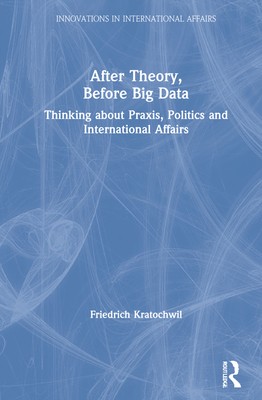
- We will send in 10–14 business days.
- Author: Friedrich Kratochwil
- Publisher: Routledge
- ISBN-10: 1032006587
- ISBN-13: 9781032006581
- Format: 15.6 x 23.4 x 1.3 cm, hardcover
- Language: English
- SAVE -10% with code: EXTRA
Reviews
Description
This book's key purpose is to contribute to the ongoing "theoretical" discussion in the field of international relations (IR) concerning the status of grand theories.
However, it also has a wider, critical mission: to challenge mainstream social science and its dominant methodology, as well as the unfettered optimism that the problem of social order can be solved by the "application" of scientific knowledge to our practical problems. The author uses rigorous philosophical analysis to focus on the unexamined assumptions that form the bedrock of many contemporary scholars in IR and demonstrates the unavailability of a universal "scientific" procedure for finding the facts, when we face practical choices and issues of social reproduction.
This book will be of interest to upper-level students of IR, sociology, history, and philosophy of science; it will also speak to students of security, foreign policy making, migration, and political economy, in addressing the basis of their attitudes in thinking about the world and the role of scholarship.
EXTRA 10 % discount with code: EXTRA
The promotion ends in 20d.15:14:15
The discount code is valid when purchasing from 10 €. Discounts do not stack.
- Author: Friedrich Kratochwil
- Publisher: Routledge
- ISBN-10: 1032006587
- ISBN-13: 9781032006581
- Format: 15.6 x 23.4 x 1.3 cm, hardcover
- Language: English English
This book's key purpose is to contribute to the ongoing "theoretical" discussion in the field of international relations (IR) concerning the status of grand theories.
However, it also has a wider, critical mission: to challenge mainstream social science and its dominant methodology, as well as the unfettered optimism that the problem of social order can be solved by the "application" of scientific knowledge to our practical problems. The author uses rigorous philosophical analysis to focus on the unexamined assumptions that form the bedrock of many contemporary scholars in IR and demonstrates the unavailability of a universal "scientific" procedure for finding the facts, when we face practical choices and issues of social reproduction.
This book will be of interest to upper-level students of IR, sociology, history, and philosophy of science; it will also speak to students of security, foreign policy making, migration, and political economy, in addressing the basis of their attitudes in thinking about the world and the role of scholarship.


Reviews